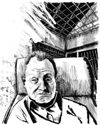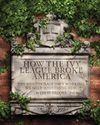Why are so many kids with bright prospects killing themselves in Palo Alto?
The air shrieks, and life stops. First, from far away, comes a high whine like angry insects swarming, and then a trampling, like a herd moving through. The kids on their bikes who pass by the Caltrain crossing are eager to get home from school, but they know the drill. Brake. Wait for the train to pass. Five cars, double-decker, tearing past at 50 miles an hour. Too fast to see the faces of the Silicon Valley commuters on board, only a long silver thing with black teeth. A Caltrain coming into a station slows, invites you in. But a Caltrain at a crossing registers more like an ambulance, warning you fiercely out of its way.
The kids wait until the passing train forces a gust you can feel on your skin. The alarms ring and the red lights flash for a few seconds more, just in case. Then the gate lifts up, signaling that it’s safe to cross. All at once life revives: a rush of bikes, skateboards, helmets, backpacks, basketball shorts, boisterous conversation. “Ew, how old is that gum?” “The quiz is next week, dipshit.” On the road, a minivan makes a left a little too fast—nothing ominous, just a mom late for pickup. The air is again still, like it usually is in spring in Palo Alto. A woodpecker does its work nearby. A bee goes in search of jasmine, stinging no one.
In many parts of town, you can hear the warning of a passing train just about everywhere: the quad at Palo Alto High School; the tables at Piazza’s grocery store, where kids from Gunn High School hang out after school; the kids’ bedrooms after midnight.
Esta historia es de la edición December 2015 de The Atlantic.
Comience su prueba gratuita de Magzter GOLD de 7 días para acceder a miles de historias premium seleccionadas y a más de 9,000 revistas y periódicos.
Ya eres suscriptor ? Conectar
Esta historia es de la edición December 2015 de The Atlantic.
Comience su prueba gratuita de Magzter GOLD de 7 días para acceder a miles de historias premium seleccionadas y a más de 9,000 revistas y periódicos.
Ya eres suscriptor? Conectar

The Dark Origins of Impressionism
How the violence and deprivation of war inspired light-filled masterpieces

The Magic Mountain Saved My Life
When I was young and adrift, Thomas Manns novel gave me a sense of purpose. Today, its vision is startlingly relevant.

The Weirdest Hit in History
How Handel's Messiah became Western music's first classic

Culture Critics
Nick Cave Wants to Be Good \"I was just a nasty little guy.\"

ONE FOR THE ROAD
What I ate growing up with the Grateful Dead

Teaching Lucy
She was a superstar of American education. Then she was blamed for the country's literacy crisis. Can Lucy Calkins reclaim her good name?

A BOXER ON DEATH ROW
Iwao Hakamada spent an unprecedented five decades awaiting execution. Each day he woke up unsure whether it would be his last.

HOW THE IVY LEAGUE BROKE AMERICA
THE MERITOCRACY ISN'T WORKING. WE NEED SOMETHING NEW.

Against Type
How Jimmy O Yang became a main character

DISPATCHES
HOW TO BUILD A PALESTINIAN STATE There's still a way.